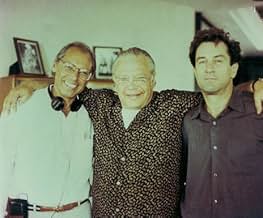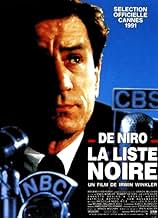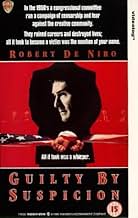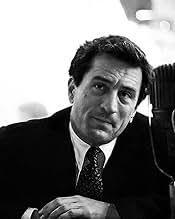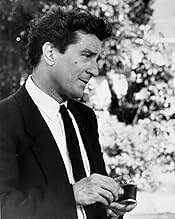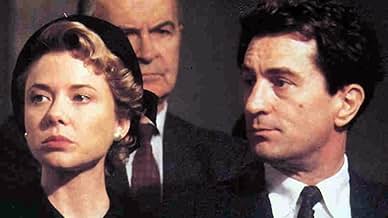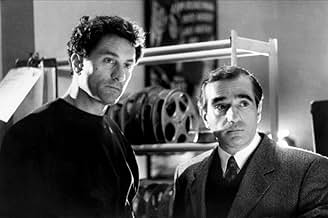IMDb-BEWERTUNG
6,5/10
10.077
IHRE BEWERTUNG
Füge eine Handlung in deiner Sprache hinzuReturning to Hollywood 1951 after working in France, a movie director meets McCarthyism head-on.Returning to Hollywood 1951 after working in France, a movie director meets McCarthyism head-on.Returning to Hollywood 1951 after working in France, a movie director meets McCarthyism head-on.
- Auszeichnungen
- 2 Gewinne & 2 Nominierungen insgesamt
Roxann Dawson
- Felicia Barron
- (as Roxann Biggs)
Empfohlene Bewertungen
Some Americans today may never have heard of Senator Joseph McCarthy and McCarthyism. McCarthyism is the practice of making accusations of subversion or treason without proper regard for evidence. The term refers to U.S. senator Joseph McCarthy (R-Wisconsin) and has its origins in the period in the United States known as the Second Red Scare, lasting from the late 1940s through the 1950s. It was characterized by heightened political repression and a campaign spreading fear of communist influence on American institutions and of espionage by Soviet agents. After the mid-1950s, McCarthyism began to decline, mainly due to the gradual loss of public popularity and opposition from the U.S. Supreme Court led by Chief Justice Earl Warren. The Warren Court made a series of rulings that helped bring an end to McCarthyism.
The movie "Guilty by Suspicion" takes place in Hollywood during the height of the Second Red Scare. The movie focuses on David Merrill (Robert De Niro) though he is indicative of many Hollywood personnel affected by the Communist witch hunting.
David, by all indications, was a gainfully employed movie director that was in constant demand. He would have been able to stay gainfully employed so long as he told the F.B.I. what they wanted to hear. And they wanted to hear that certain friends of David's were Communists. David, valuing friendship over finances, opted to keep quiet about any of his friends activities. For that, David was put on the Hollywood blacklist.
"Guilty by Suspicion" is a weighty movie. We get an up close and personal look at what McCarthyism was doing to people's lives. Now I know that some of you may be saying, "Who cares? It was Hollywood." To that I would say that the Constitution never put zoning restrictions on who it applied to. The Constitution didn't have a Hollywood exemption in it and the U.S. government was trampling all over people's Constitutional rights. If they didn't have enemies within the U.S. they were certainly making them.
The movie "Guilty by Suspicion" takes place in Hollywood during the height of the Second Red Scare. The movie focuses on David Merrill (Robert De Niro) though he is indicative of many Hollywood personnel affected by the Communist witch hunting.
David, by all indications, was a gainfully employed movie director that was in constant demand. He would have been able to stay gainfully employed so long as he told the F.B.I. what they wanted to hear. And they wanted to hear that certain friends of David's were Communists. David, valuing friendship over finances, opted to keep quiet about any of his friends activities. For that, David was put on the Hollywood blacklist.
"Guilty by Suspicion" is a weighty movie. We get an up close and personal look at what McCarthyism was doing to people's lives. Now I know that some of you may be saying, "Who cares? It was Hollywood." To that I would say that the Constitution never put zoning restrictions on who it applied to. The Constitution didn't have a Hollywood exemption in it and the U.S. government was trampling all over people's Constitutional rights. If they didn't have enemies within the U.S. they were certainly making them.
In 1947 the House Committee on Un-American Activities began an investigation into Communism in Hollywood. Shortly after this director David Merrill returns from filming abroad. It is not long before he is targeted for having attended "a few meetings" a few years ago. The approach is softly, softly with the committee just wanting Merrill to name some more names for them. When he refuses to help, he finds himself gradually cut out of studios and projects, with fewer and fewer people willing to take his calls.
The period of history around which this film is set is an interesting one and one that is worth knowing about as part of the whole "learning from history" ideal. However this is not the same as the film itself being good because unfortunately it is not what I would have liked. It relies too heavily on the informative nature of the recreation of the period rather than developing an interesting script with realistic characters. It doesn't help that the film tries to be all very serious and respectful but does rather fail and ends up coming over all earnest and self important. The script also tries not to really upset anyone who didn't take the moral stance of the fictional Merrill by just focusing on him even though it would have been a lot more interesting if it had had outrage, bitterness and realism at its heart.
Winkler directs without a great deal of style and his courtroom scene is average where it should have been the best scene of the film. De Niro works his material hard and makes for an engaging lead, however it is the lack of depth and complexity in his material that limits his performance. This is more or less true of the rest of the cast which, although starry, doesn't really provide anyone in particular with an opportunity to mark themselves out. Bening, Wendt, Wettig, Wanamaker, Sizemore, Scorsese, Cooper and others are good presences but not much more than that.
Overall then an interesting film in so much as it informs about an important period of history. However it is all very earnest and safe and lost a lot of potential for me. The cast is starry but the material is middle-of-the-road and didn't give anyone the complexity and outrage that the subject deserved.
The period of history around which this film is set is an interesting one and one that is worth knowing about as part of the whole "learning from history" ideal. However this is not the same as the film itself being good because unfortunately it is not what I would have liked. It relies too heavily on the informative nature of the recreation of the period rather than developing an interesting script with realistic characters. It doesn't help that the film tries to be all very serious and respectful but does rather fail and ends up coming over all earnest and self important. The script also tries not to really upset anyone who didn't take the moral stance of the fictional Merrill by just focusing on him even though it would have been a lot more interesting if it had had outrage, bitterness and realism at its heart.
Winkler directs without a great deal of style and his courtroom scene is average where it should have been the best scene of the film. De Niro works his material hard and makes for an engaging lead, however it is the lack of depth and complexity in his material that limits his performance. This is more or less true of the rest of the cast which, although starry, doesn't really provide anyone in particular with an opportunity to mark themselves out. Bening, Wendt, Wettig, Wanamaker, Sizemore, Scorsese, Cooper and others are good presences but not much more than that.
Overall then an interesting film in so much as it informs about an important period of history. However it is all very earnest and safe and lost a lot of potential for me. The cast is starry but the material is middle-of-the-road and didn't give anyone the complexity and outrage that the subject deserved.
Upon reading through 20 or so of the last reviews of "Guilty by Suspicion" it dawned on me that the majority of the reviewers are only vaguely familiar with the history associated with the film. Robert De Niro's DAVID MERRILL is an almost direct representation of real-life director ELIA KAZAN, known for such great films as "A Streetcar Named Desire" and "On the Waterfront". Only the names have been changed, but the main points of KAZAN's struggle are all intact. Even long-time friend Arthur Miller and wife Marilyn Monroe make an appearance (under different names, of course).
The story depicted in this film is not only perfectly representational of the black list era Hollywood, but is actually perfectly factual and accurate down to the small details. Reviewers should really do more research before "guessing" at what they just saw.
The story depicted in this film is not only perfectly representational of the black list era Hollywood, but is actually perfectly factual and accurate down to the small details. Reviewers should really do more research before "guessing" at what they just saw.
Robert DeNiro plays David Merrill, a movie director who is 'Zanuck's wonder boy' at Fox as the movie opens. He's been in Europe for awhile so does not know the full impact the HUAC has been exerting on actors in Hollywood. Zanuck asks David to 'purge himself' so instructs him to meet with a man who has a lot of questions for him, all having to do with people he might or might not know (real actors names are mentioned in this scene) and DeNiro complies, but only to a point, because his best friend Bunny Baxter (George Wendt) is the last name on the 'list.' David can't deal with any of it anymore and storms out of the meeting.
Eventually he finds out the hard way that because he is being uncooperative, he is being portrayed as a Communist sympathizer and cannot get anymore work as a director in movies so he moves to New York to try to get work in the theatre.
Movie has a strange feel to it. There is something underlying in almost every scene, a strange current that flows through the movie because so much of this is about what is unsaid, what is damaging and what is the right thing to do. Husbands betray wives, best friends name best friends, and no one knows how to destroy this thing that has invaded them.
DeNiro, Annette Bening, George Wendt and Chris Cooper are riveting. Sam Wanamaker, Martin Scorsese, Tom Sizemore and Ben Piazza are very good in small roles. Patricia Wettig goes slightly over the top as an actress whose child was taken from her.
Not fun, but worth seeing, and for fans of old cars, DeNiro drives around in the most beautiful white convertible you've ever seen. Wish I knew what type of car it is! 8/10.
Eventually he finds out the hard way that because he is being uncooperative, he is being portrayed as a Communist sympathizer and cannot get anymore work as a director in movies so he moves to New York to try to get work in the theatre.
Movie has a strange feel to it. There is something underlying in almost every scene, a strange current that flows through the movie because so much of this is about what is unsaid, what is damaging and what is the right thing to do. Husbands betray wives, best friends name best friends, and no one knows how to destroy this thing that has invaded them.
DeNiro, Annette Bening, George Wendt and Chris Cooper are riveting. Sam Wanamaker, Martin Scorsese, Tom Sizemore and Ben Piazza are very good in small roles. Patricia Wettig goes slightly over the top as an actress whose child was taken from her.
Not fun, but worth seeing, and for fans of old cars, DeNiro drives around in the most beautiful white convertible you've ever seen. Wish I knew what type of car it is! 8/10.
The merit of this film is that it portrays the mechanism, the mentality and the impact on human character of what might very well be any communist regime there ever was in a stunningly perfect way (as a person grown up in a socialist country, believe me - I know!) - only here represented by people who are supposed to prevent communism from spreading! A great comment on human nature - whether intended or not is less important. If I didn't know better, I'd believe this was a Hollywood remake of some film about Stalin's 30:s purges or Polish repressions against the right wing combatants in the 50:s. Solid performance from De Niro, supported by a talented cast. Martin Scorsese appears in a cameo that must be one of the most extensive in his acting career.
Wusstest du schon
- WissenswertesMartin Scorsese portrays a fictional director called "Joe Lesser". This character is based on director Joseph Losey, who left Hollywood in the 1950s rather than face the HUAC examinations.
- PatzerThere is a Milwaukee Braves baseball pennant on the wall of Merrill's son's room. This film takes place in 1951 and 1952. The Braves didn't move to Milwaukee from Boston until 1953.
- Zitate
David Merrill: [to the Blacklist Committee] Fuck them!
- SoundtracksStraighten Up and Fly Right
Written by Nat 'King' Cole and Irving Mills
Performed by Nat 'King' Cole
Courtesy of Capitol Records, Inc.
By arrangement with CEMA Special Markets
Top-Auswahl
Melde dich zum Bewerten an und greife auf die Watchlist für personalisierte Empfehlungen zu.
- How long is Guilty by Suspicion?Powered by Alexa
Details
- Erscheinungsdatum
- Herkunftsland
- Sprache
- Auch bekannt als
- Culpable por sospecha
- Drehorte
- Produktionsfirmen
- Weitere beteiligte Unternehmen bei IMDbPro anzeigen
Box Office
- Budget
- 13.000.000 $ (geschätzt)
- Bruttoertrag in den USA und Kanada
- 9.480.198 $
- Eröffnungswochenende in den USA und in Kanada
- 2.278.290 $
- 17. März 1991
- Weltweiter Bruttoertrag
- 9.480.198 $
- Laufzeit1 Stunde 45 Minuten
- Farbe
- Sound-Mix
- Seitenverhältnis
- 1.85 : 1
Zu dieser Seite beitragen
Bearbeitung vorschlagen oder fehlenden Inhalt hinzufügen



